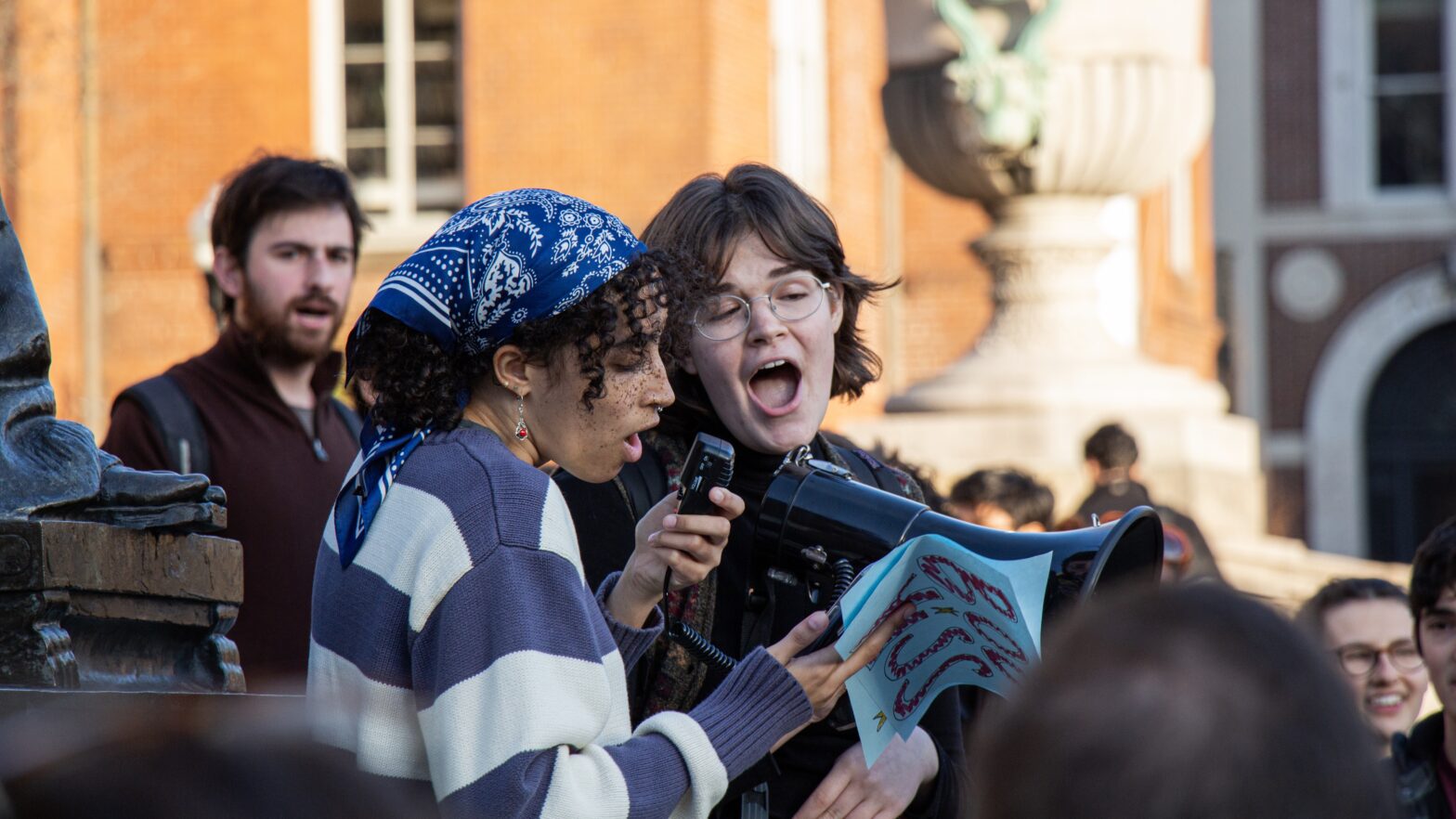“The first thing we’re going to do is knock on his door,” said Leena Yumeen, a second-year political science major and residential advisor at Columbia University. She raised her fist in protest in front of Columbia University President Lee Bollinger’s home then rapped it against the wood. Just hours prior, Bollinger had declined to voluntarily recognize the RAs’ union.
Yumeen is one of roughly 70 RAs, students, and labor organizers who gathered in support of Columbia University’s Residential Advisors’ (CURA) unionization efforts on Feb. 20. The group is one of the latest in New York to publicly announce plans to form a union.
Columbia RAs formed the CURA Collective this past spring to demand equitable pay and better working conditions.
CURA’s push to unionize was driven primarily by what RAs, including Yumeen, described as unfair compensation and poor working conditions, as well as unclear disciplinary procedures, harassment recourse policies, and general expectations. She, and other RAs, also believed that they were misclassified by their employer as independent contractors instead of employees. Columbia University RAs publicly expressed that they felt used by their school’s administration for cheap labor while speaking at the rally.
In the spring 2022 semester, Yumeen’s job as an RA entailed, among other things, handling student mental health crises and sexual assault in dorms. “I felt like I couldn’t do this anymore,” she said. “[My residents] were coming to me, and I couldn’t help them.”
In March 2022, a small handful of RAs began to draft an open letter to the Columbia Student Council, demanding fair pay and improved working conditions. Yumeen immediately became one of the RAs spearheading the efforts pushing for both of those demands as the letter was circulated in RA group chats.
The official letter directed to the Columbia University Residence Life Staff and the Board of Trustees was developed by the “nascent CURA Collective” and published on May 11, 2022, once at least a third of the RAs had signed on to it, Yumeen said. The letter, which represented CURA’s first action as a Collective, stated that “Residential Life and Columbia University are failing to adequately support [RAs] as student workers [in the areas of]: (1) payment and (2) democratic channels for communication.” The collective of RAs then offered a list of remedies for the issues they had raised.
Lexy Pryor, a fellow RA and second-year earth and environmental engineering major, agreed with the letter, calling the payment plan for RAs prior to and during AY 21-22, where RAs were provided complimentary housing and a $1,000 stipend for their work each year, “a regressive payment scheme.” She explained that because RAs weren’t charged for housing, which ranges from $9,986 to $11,096, when Columbia calculated RAs’ financial need, it was lower than it may have otherwise been since the student was technically being billed less. “People would actually end up getting less financial aid [if they worked as an RA],” she said.
Some RAs have a financial aid package from the school that already covered the cost of housing, meaning that $1,000 was the only compensation they received for a full year of work. “We’re primarily first generation, low income students, people of color. That’s the brunt of people making up the RA role,” she said. “We’re workers, and we’re working our asses off to be able to attend the school.”
Over the summer of 2022, The CURA Collective engaged in “really intentional outreach,” Yumeen said. That outreach “entailed calling every single RA,” to tell them about CURA’s plans to organize for better pay and working conditions, asking them if they wanted to get more involved, and learning more about the issues each RA faced.
On June 30, CURA delivered their full list of demands directly to the Board of Trustees. Nearly a month later, on July 26, they received a response from the university, offering the RAs an individual choice between remaining on the old payment plan and receiving an updated payment plan. Under the new plan, the student is charged for housing and paid $13,000 over the course of the semester in four installments.
“We thought that was a huge win for all our RAs, especially for people on full financial aid,” Yumeen said. “But, there have been some problems.” International students “get taxed 30% on income,” so for them, the new payment policy would mean “they’re not even making the cost of housing because housing is [about] $11,000.” 30% of $13,000 is $3,900, meaning that international students would only make $9,100 after taxes under this new plan.
In September, the committee started holding one-on-one conversations with every RA at Columbia. Pryor said their focus was to “talk to everyone in different buildings, to see what their experiences had been like,” and to see how they felt about unionization.
After months of work and outreach efforts, on Oct. 23, 2022, nine RAs at an Organizing Committee meeting officially voted to unionize as an independent union, according to an internal document from the Collective. By late October, RAs began collecting signatures on their union cards throughout their meetings and during one-on-one conversations.
According to Pryor, on Jan. 22, another RA meeting took place. At this meeting, the Organizing Committee members announced plans to form a union to the entire body of RAs. They also used the meeting as an opportunity to gather more democratic demands. Since this meeting, more than 75% of RAs have signed union cards.
President Bollinger’s decline of voluntary recognition for the union on Feb. 20 meant that CURA needed to file with the National Labor Relations Board to unionize, a step they took on Feb. 26. Now, there will be a brief waiting period followed by an official union election amongst all Columbia RAs. A simple majority voting yes will result in the RAs independently unionizing.
RAs at Fordham University and Barnard College have faced similar challenges in their workplaces which have led them to organize their own unionization campaigns over the past year as well.
“There were many incidents over the past years where we didn’t feel protected by ResLife and other organizations on campus,” said Sophia Ghelardini, a second-year Integrative Neuroscience student and RA at Fordham University. “A lot of our financial aid has changed even though they’ve promised not to do so.” Ghelardini explained that RAs had to “work [additional jobs] in order to afford tuition.”
At Barnard, unfair compensation was at the top of the list of issues faced by RAs as well. “Our breaking point was when we were told we wouldn’t be given a meal plan while working as summer RAs in 2022,” said Aditi Misra, a senior pursuing economics and an RA at Barnard College. She said that prior to summer 2022, summer RAs had received meal plans, so she “knew it was untrue” that the college could not afford to provide them with one. That led to all 17 RAs employed over the summer “threatening to strike.”
Due to the shared understanding of difficult working conditions and inadequate compensation, RAs around the city have been ready to support their peers at Columbia before their unionization efforts were made public. Fordham RA and international studies and media visual design major, Tarchithaa Chandra Sekharan, said she “knew Columbia was going to go public” with their unionization campaign before CURA released their statement. Through a “massive group chat” consisting of organizers from RA collectives across the city, “CURA told us what they were doing and what they needed. We said, of course, we’re there.”
Columbia RAs’ unionization efforts were strengthened by CURA’s effective organizing and the growing city-wide solidarity between RA collectives across universities in New York and the OPEIU Local 153 Union. Local 153 supports higher education and clerical workers at universities, among other workforces.
Scott Williams, a union organizer from OPEIU Local 153, has been the primary contact for RA groups across the city that are seeking information on how to unionize, including Columbia University, Barnard College, Rensselaer Polytechnic Institute, Fordham University, and Wesleyan University. According to Williams, when clerical workers at Wesleyan, represented by Local 153, were facing layoffs last year, “the student workers [at Wesleyan] showed up in solidarity” to help defend their jobs. In turn, Local 153 union organizers supported Wesleyan RAs efforts to unionize, Williams said. “They reached out to us because of our previous relationship and presence on campus.” Those RAs successfully unionized in the spring of 2022.
After they heard about the victory of the Wesleyan campaign, RA organizers at Columbia University reached out to Williams for support as they began efforts to unionize themselves. “We supported Columbia starting in June 2022,” he said.
The RA groups’ unionization strategies have stemmed from their collaboration with each other and Williams of the OPEIU Local 153 Union. Since the success of the Wesleyan campaign, Williams says he’s been “training [RAs in] basic skills in organizing, how to talk to other workers, build a network, build a committee, and work with, support, and represent their coworkers.”
This training was vital for Sekharan and other Fordham RAs. The group reached out to Williams for advice on unionizing. “We started organizing pretty early in the fall…and started petitioning after winter training this year. So many people signed on so quickly because we had spent so much time talking and organizing that we actually moved through the petitioning in about two weeks. People were ready to sign on,” Sekharan said.
“It’s so critical to see yourself at another campus, to see that you’re supported, not just by your immediate community, but by people who are total strangers who happen to be the same exact position as you. It’s incredibly powerful,” Williams said.
Misra accredited both Williams and other RA collectives, including CURA, for their support in helping Barnard unionize. Through CURA, Misra spoke with Yumeen to explore the possibility of “strategizing together and helping each other out.” This led to OPEIU’s involvement in Barnard RAs’ unionization process, who, she said, “guided me through all of this.” Today, Barnard RAs are an officially recognized union, and Misra was a part of the Bargaining Committee when they began negotiating their first contract in January of this year.
New York State Assembly Member Zohran Mamdani (D-36), who spoke at the Columbia RA rally last week understands the collective power fueling the RAs’ wins as a part and product of the larger labor movement. “I would say that this is a very exciting time for labor, where there are so many victories that have been an inspiration for workers everywhere, and people are finally being paid what they’re due. And I think that this [CURA’s unionization effort] is an outgrowth of that imagination, that maybe we can actually get paid [justly] for our work,” he said. “When I heard that there were students at Columbia University trying to unionize and they weren’t being granted voluntary recognition, I thought that it was necessary for me to be here to support them in that.”
Steve Fraser, who attended CURA’s unionization rally, organizes with the group Labor Springs, a collaboration between unions and leftist groups in NYC. “A number of people, mainly academics, put out a call to kind of mobilize the energy of the labor movement on campuses all across the country. There are now 50 campuses in 37 states that have responded to this call, organizing local activities, teach-ins, and rallies. The idea is to rally around the right to organize, to draw the connection between a strong labor movement and democracy,” Fraser said. “[We] want to alert people to this movement to organize all over the country – Not just on campuses, but at Starbucks and Amazon and so on,” Fraser continued.
As he talked with CURA members Leena Yumeen and Lexy Pryor on the steps of Columbia’s Low Library about organizing city-wide events over the next few months, RAs tied a large banner with the words “Students > Profits! Workers > Trustees!” to the building’s pillars.
Additional writing and reporting by Bia Rodriguez
Correction: The verb tense used in an earlier version of this story implied that Barnard’s RAs had completed contract negotiations. At the time of writing, their negotiations were still ongoing.








Leave a Reply